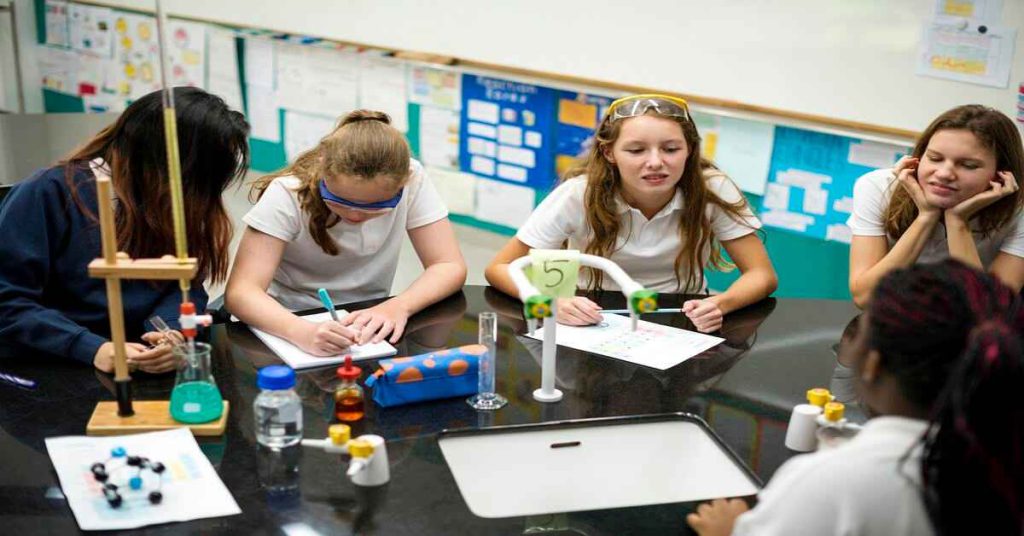Supporting your child to excel in GCSE Chemistry goes beyond academics; it’s about fostering confidence, encouraging proactive learning, and ensuring they have access to the right resources. This guide provides parents with actionable insights and proven strategies to help their child achieve a Grade 9 GCSE Chemistry.
1. Encouraging Proactive Engagement for Grade 9 GCSE Chemistry
Pre-Lesson Preparation:
Encourage your child to preview topics before lessons. Reading ahead builds familiarity with the material, making classroom learning more effective and engaging.
Active Participation:
Teach your child the importance of actively engaging in lessons by asking questions and seeking clarification. This habit ensures they grasp complex concepts early and prevent gaps in understanding.
2. Helping Your Child Create a Structured Revision Plan
Design a Comprehensive Study Schedule:
Work with your child to develop a detailed revision timetable. Ensure it aligns with their exam board’s specification, covering all topics systematically, with extra time for areas they find challenging.
Use Active Revision Techniques:
Guide your child in using active learning tools like mind maps, flashcards, and mnemonic devices. These methods make studying more engaging and effective by enhancing retention and understanding.
Provide Diverse Learning Resources:
Encourage your child to explore a mix of resources, such as online platforms like Seneca, YouTube channels like Free Science Lessons, and practise books. Supplementing these with personalised tutoring from GX Tuition can further enhance their understanding, as it provides tailored guidance to address individual challenges.
3. Fostering Mastery of Core Concepts and Calculations
Strengthen Their Grip on Key Equations:
Help your child achieve fluency in crucial Chemistry equations, such as mole calculations and concentration formulas. These are foundational for excelling in problem-solving questions.
Practise Regularly:
Encourage consistent practise of numerical problems, balancing equations, and interpreting chemical data. This approach boosts both confidence and accuracy in handling exam questions.
4. Guiding Your Child to Focus on Challenging Topics
Prioritise Difficult Areas:
Work with your child to identify and allocate extra time for topics they find difficult, such as:
- Quantitative Chemistry
- Energy Changes
- Reversible Reactions
- Le Chatelier’s Principle
Follow the Specification:
Use the exam board’s specification as a roadmap to ensure all required topics are covered. This ensures nothing is left out during revision.
5. Helping Your Child Develop Exam Techniques
Encourage Past Paper Practise:
Motivate your child to complete past exam papers under timed conditions. This practise builds familiarity with the exam structure and helps them manage time effectively.
Guide Them on Extended Questions:
Teach your child how to tackle six-mark questions by breaking down their answers into structured points, ensuring they address all aspects of the question.
Understand Mark Schemes:
Review mark schemes with your child so they can align their answers with examiner expectations, maximising their chances of securing full marks.
6. Promoting Consistent Review and Adaptation
Self-Assessment and Feedback:
Encourage your child to regularly assess their progress through quizzes, self-tests, or tutor feedback. This helps identify weak areas and improve them promptly.
Flexibility in Strategies:
Help your child experiment with different revision strategies to find what works best for them. Adapt their approach based on progress and comfort.
Final Thoughts for Parents
Achieving a Grade 9 GCSE Chemistry is not just about hard work; it’s about working smart and using the right strategies. Enrolling your child in trusted programmes, such as GX Tuition, can provide the additional support they need to excel. As a parent, you play a critical role in supporting your child’s journey by encouraging proactive learning, providing access to quality resources, and fostering confidence.
Success comes from consistent effort, structured planning, and a belief in their ability to excel. With your guidance, combined with expert support from services like GX Tuition, your child is well on their way to mastering GCSE Chemistry and achieving their goals.
FAQs
1. How can my child effectively prepare for Grade 9 GCSE Chemistry?
Encourage structured revision plans, active learning techniques, and consistent practise. Personalised support from resources like GX Tuition can enhance preparation.
2. What are the most challenging GCSE Chemistry topics to focus on?
Topics like Quantitative Chemistry, Energy Changes, and Le Chatelier’s Principle often require additional focus and practise for thorough understanding.
3. Are past papers important for Grade 9 GCSE Chemistry success?
Yes, practicing past papers under timed conditions improves exam technique, familiarises students with question types, and enhances time management skills.
4. How can parents support their child’s GCSE Chemistry revision?
Parents can provide structured study schedules, access to quality resources like GX Tuition, and encouragement to stay consistent and confident.
5. What role do online platforms play in GCSE Chemistry preparation?
Platforms like Seneca and Free Science Lessons offer diverse, engaging content, complementing traditional resources and personal tutoring for effective learning.


